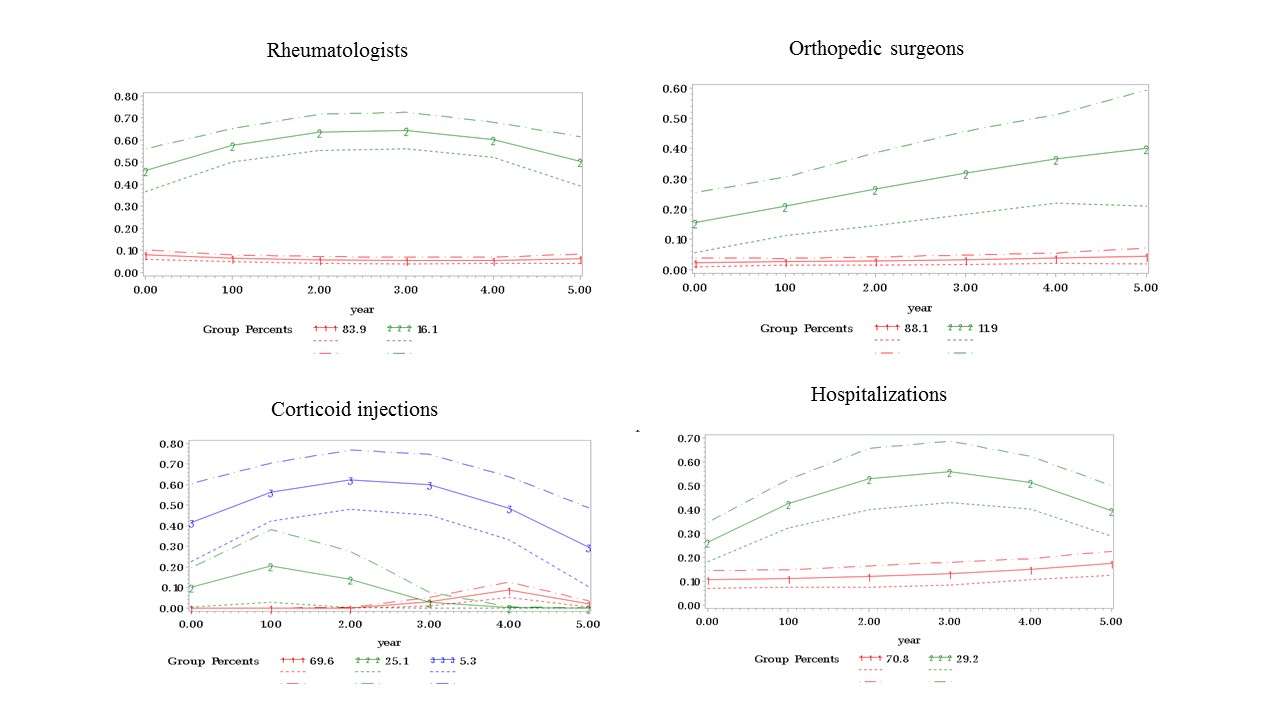Session Information
Date: Monday, November 6, 2017
Title: Health Services Research Poster II: Osteoarthritis and Rheumatoid Arthritis
Session Type: ACR Poster Session B
Session Time: 9:00AM-11:00AM
– Background/Purpose: in hip and knee OA, one of the leading causes of global disability, recent population-based data of health care practices and utilization are scarce. Describing trajectories of patients’ patterns of care and their predictive factors is important to adapt health care practices and guide interventions to optimize patients’ use of health care services. The aim of the study was to describe health care utilization trajectories and associated factors of a representative sample of patients with knee or hip symptomatic OA.
– Methods: the KHOALA cohort is a French population-based multicenter cohort of 878 patients with symptomatic knee and/or hip OA, aged between 40 and 75 years old recruited between 2007 and 2009. Patients are followed annually by self-report questionnaires. Analyses used the data from the 5 first years of the follow up. We used Latent Class Growth Analyses (LCGA) to define homogeneous subgroups of trajectories based on the individual health care consumptions over time, and logistic regressions to explain the differences between the identified trajectories with baseline characteristics.
– Results: Among the 878 patients, 609 (69%) were women, 222 (25%) have hip OA, 607 (69%) knee OA and 49 (6%) both hip and knee OA. Groll comorbidity index (0-18) was 3.1 (1.6). The most optimal and clinically relevant models retrieved by LCGA were two group models for consultations with the different health care professionals (primary care physician (PCP), rheumatologist, orthopedic surgeon, physiotherapist), hospitalizations, use of assisting devices and acid hyaluronic (AH) injections, and 3 group models for corticoids injections and use of complementary and alternative medicine (CAM). In multivariate analyses, increasing age was independently associated with the trajectory of high number of consultations with PCP and rheumatologist, and with a high use of corticoids injections or complementary medicine. Impaired mental health was associated with the groups of frequent consultations with PCP, rheumatologists and physiotherapists and with corticoid injections. Pain was only associated with increasing number of orthopedic surgeons consultations and high use of assisting devices. Impaired function abilities were only associated with frequent hospitalizations. Comorbidities are associated with PCP consultations and hospitalizations (frequent use).
– Conclusion: In multivariate analyses, mental health impairment is the only symptom associated with trajectories of frequent use of medical care while pain is only associated with orthopedic surgeon consultations.
To cite this abstract in AMA style:
Rat AC, Salmon JH, Ngueyon Sime W, Wieczorek M, Saraux A, Gard C, Guillemin F, Fautrel B. Evolution of Health Care Consumption in the Knee and Hip Osteoarthritis Long Term Assessment Cohort, a French Population Based Cohort of Symptomatic Knee and/or Hip OA Patients [abstract]. Arthritis Rheumatol. 2017; 69 (suppl 10). https://acrabstracts.org/abstract/evolution-of-health-care-consumption-in-the-knee-and-hip-osteoarthritis-long-term-assessment-cohort-a-french-population-based-cohort-of-symptomatic-knee-andor-hip-oa-patients/. Accessed .« Back to 2017 ACR/ARHP Annual Meeting
ACR Meeting Abstracts - https://acrabstracts.org/abstract/evolution-of-health-care-consumption-in-the-knee-and-hip-osteoarthritis-long-term-assessment-cohort-a-french-population-based-cohort-of-symptomatic-knee-andor-hip-oa-patients/

